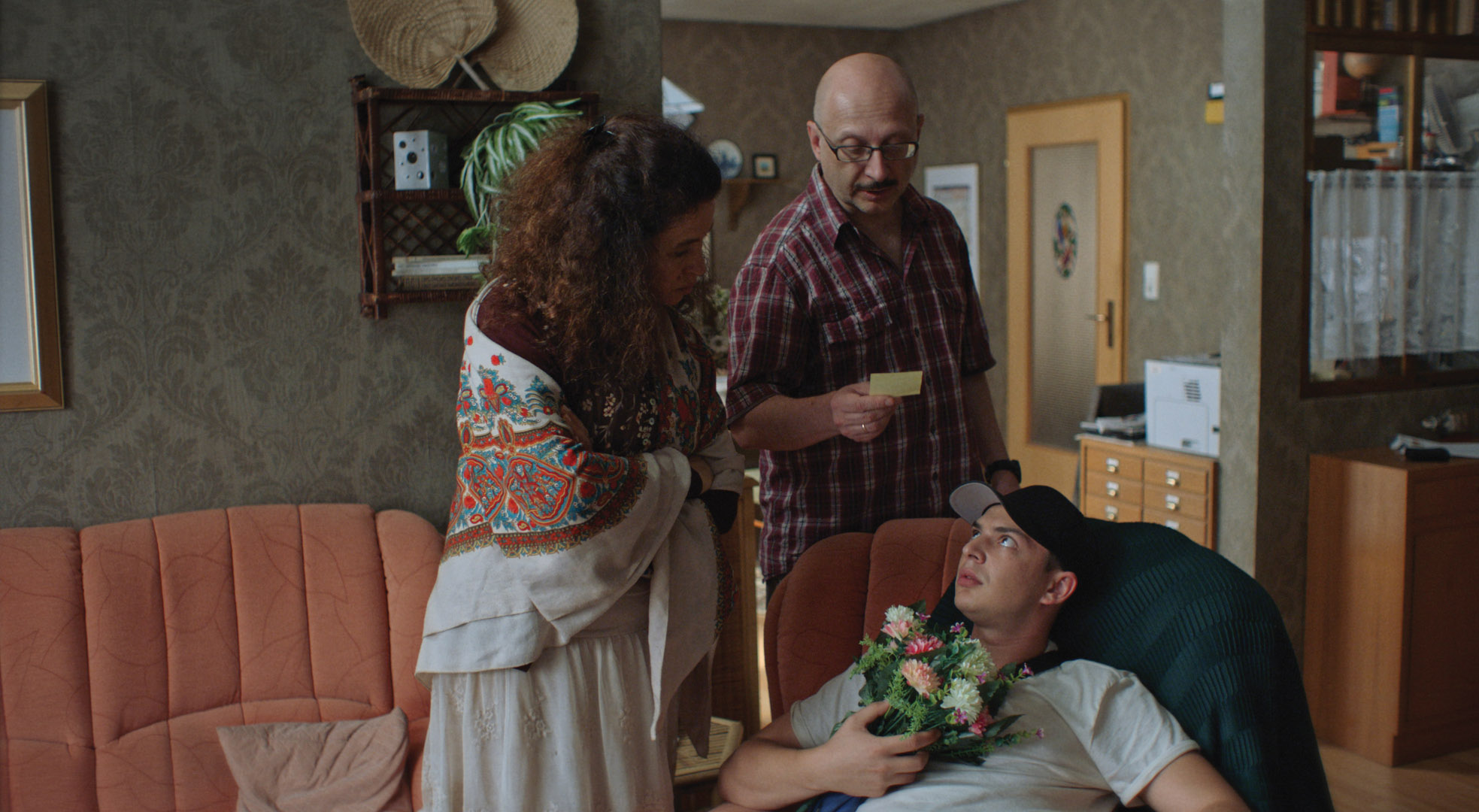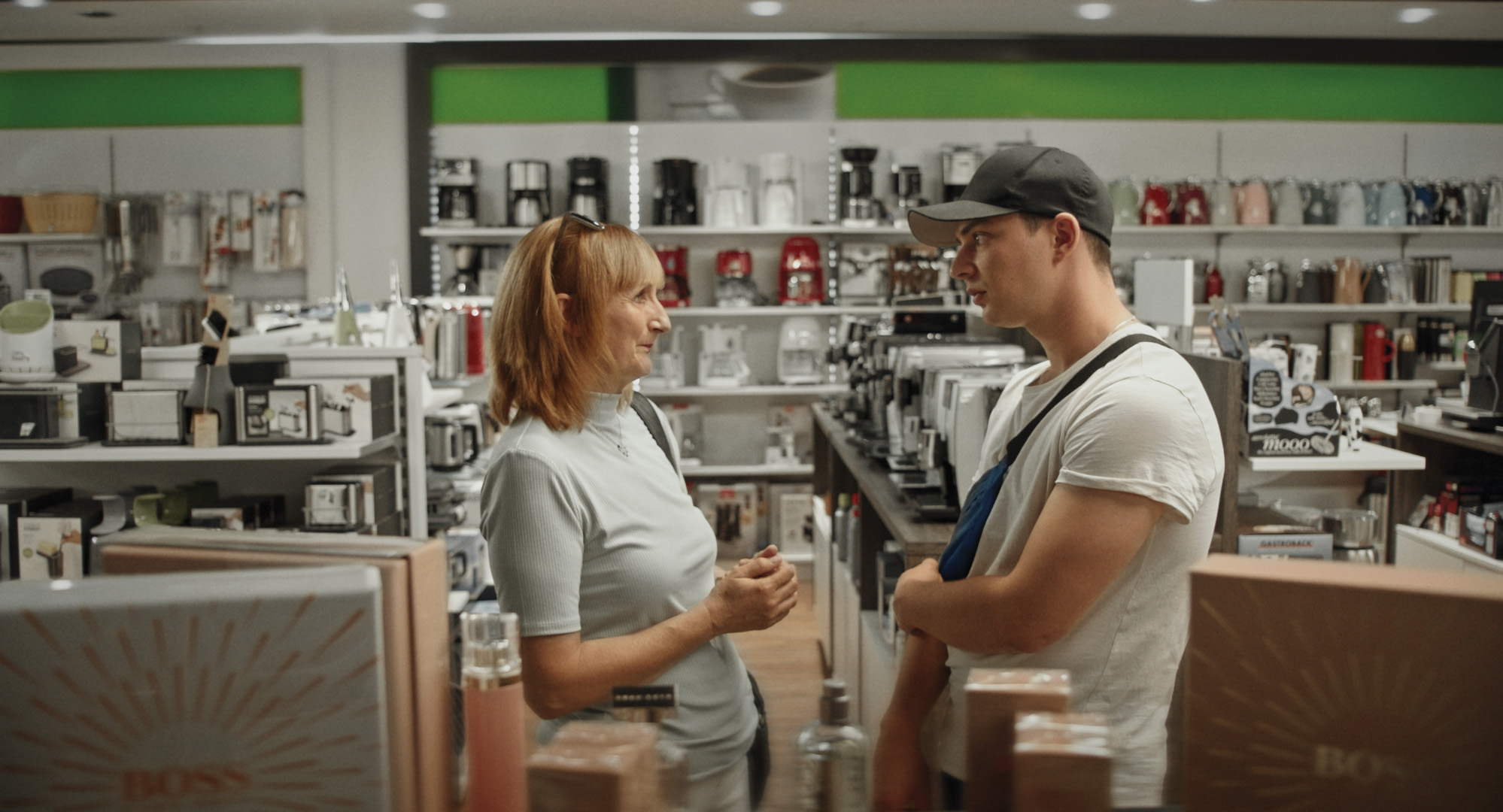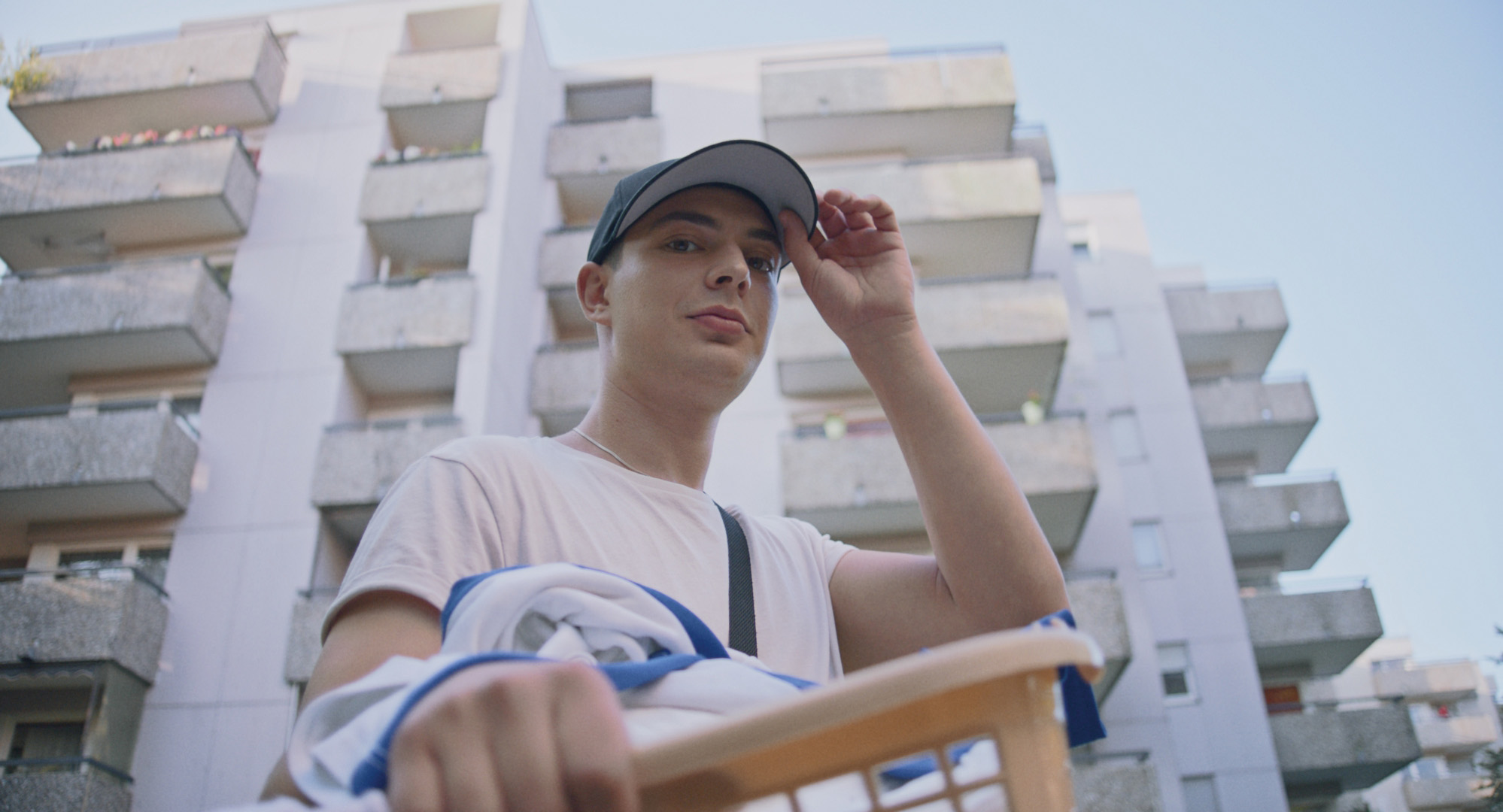Breakfast with Masel Tov Cocktail
Interview with Arkadij Khaet and Mickey Paatzch, directors of Masel Tov Cocktail
The short deals with identity and stereotypes. What has drawn you to make a film about this issue?
This project was the third-year project in film school. Every film student has heard the phrase “Make something of your own life reality.” Hence, it all started with this idea: What does it feel like to be Jewish in Germany? And how can we transport this feeling through a mix of statistics, documentary snippets, monologues and character archetypes in the German-Jewish dialogue. We asked ourselves “What do Germans actually know about Jews? Tell me five things except Hitler, Holocaust, Israel and antisemitism.” The basic problem is that the only reason why Jews in Germany are talked about are the Holocaust and Antisemitism. Germans know Jews only from one distinct point of view: We are the perpetrators – they are the victims. And Germans always approach Jewish culture with this background in mind, if they approach it at all. Jews are assigned with a certain role in Germany. A “good” Jew is the one who takes the weight away from German shoulders and confirms that they became “good Germans” and that Jewish life is safe in Germany and can prosper. A “bad” Jew is an aggressive Jew, who doesn’t fit into this established script. In Germany, generations were raised with a perspective of seeing Jews only as victims. The people aren’t used to speaking to Jews or get to know them. So as a Jew you are always confronted with these stereotypes. And of course, we wanted to address the Russian-speaking Jewish community in Germany, in which Arkadij grew up and which makes up the majority of the Jews living here. We wanted to make an entertaining, empowering film; a film, that you are not only watching because it is an important topic, but because it’s actually fun.
The main character often breaks the fourth wall and talks directly to the audience. Can you explain this choice of mise en scène?
Before we started with the classic script work, we had pages and pages of monologues spoken by Dima. Dima simply talked about his perspective, how he feels and what he thinks about Germans, Jews, commemorative culture and antisemitism. When we started writing, it was pretty clear that we didn’t want to put these monologues into scenes but try to let Dima speak directly to the audience. Up until this point, we had only ever made classic, narrative films, so it definitely was an experiment to work with these breaks. It took a lot of rehearsals and a very precise camera concept to make everything look fitting later on.
Why is this an important story to tell in today’s society, from a Jewish point of view?
What kind of question is that? The answer is that every perspective is important and worth telling, especially the perspectives we don’t encounter in our everyday life. The Jewish perspective didn’t exist in German film for a long time, simply because there were no Jewish filmmakers in Germany. They were killed or fled. Since the Jewish migration in the nineties, there has been a generation that is empowered to tell their own story. A story that has not taken place on screens until now. We were tired of seeing films by non-Jewish directors who staged Jewish characters in a completely inauthentic way. Jewish characters in German films are always placed in a context of Holocaust or religious Judaism. There is a visual construction of Jewishness in Germany. This is why we wanted to break this narrative and make a film from our perspective. And the great feedback from the Jewish community in Germany proves us right. German Jews are grateful that Dima serves as a hero who they can identify with and who rebels against the narrative that has been imposed on him.
What were the challenges and benefits of working on the film together?
We met at film school in 2011 and co-directed three medium-length films in the past ten years. But in fact, our collaboration started earlier. While studying at film school, we supported each other by helping out as assistant directors. We took terms: one took the role of the director while the other one served as his assistant. We didn’t realize that in the professional world, an AD barely makes creative choices but mostly takes care of organizational issues. Unknowing as we were, we worked on the scripts and storyboards together. After we finished our first internship on a professional film set, we knew better and labelled our collaboration differently: we started to officially co-direct. In our opinion the benefits of co-directing are significant. When working as a team, you always have somebody to help you reflect on your thoughts and to question your perspective, ideas and motivation. Obviously, two heads are better than one. Working on a movie set can be exhausting, because you have to stay focussed during every single shot, may it be a detail shot. The double-constellation allows us to save our energy by taking turns in being the more active or passive part. Furthermore, it facilitates the interaction with the different departments as well as the decision making in general. Instead of talking one on one, we form a triangle with two directors and the head of the respective department. Being three persons in authority, we can decide democratically. Before we shoot, there is always a long process of finding a shared cinematic and narrative language. At this point, we try to solve every conflict there is, thus we don’t fight on set. Now let’s discuss the challenges. Of course, not everybody can form a functioning directing duo. Therefore, we just might be lucky. Sometimes you have to overcome your ego or to sacrifice one of your darlings to serve the film. This can be quite challenging. Obviously, collaborating is not possible if the two directors don’t agree on the core being of the script. Luckily, our convictions and cinematic tastes are close enough to merge but are different enough to leave a certain creative tension simultaneously.
What do you think the future holds for short films?
As directors and authors, we are probably not the best pick to predict the future of the short film genre but of course, we can have a guess! We think that short films will gain more importance in the aftermath of the Covid-19 pandemic. There might be less feature films thus production companies will get pickier about which film maker to support. Short films will become your business card to present your individual style of filmmaking – even more as they are today. Furthermore, it’s quite interesting to take a look at the future of the world of German short films. Especially as post migrants ourselves, we are looking forward to seeing a new generation of diverse storytelling in Germany.
If we were to go back into lockdown, what cultural delights would you recommend to alleviate our boredom?
Since movie theaters are closed right now, we put money into a home cinema. Of course, it’s not the most affordable recommendation, but for us it really was a game changer. Everything is more fun to watch and it helps you focus on the movie instead of checking your phone. Another issue is the process of selecting a movie on the various streaming platforms. If you are more into “arthouse” cinema or film history, we highly recommend The Criterion Channel (which isn’t available in Europe right now but can be accessed via VPN). We also think it is quite fun to explore other countries and cultures by watching exotic movies, especially because most of us probably won’t travel much next year. For example, we dove into Russian cinema and got to know some great movies and directors we hadn’t heard of before.
Masel Tov Cocktail is part of International Competition I2.











